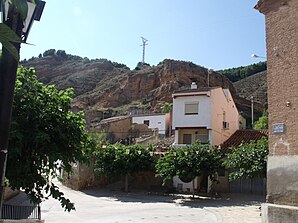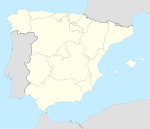Tosos
| Tosos municipality | ||
|---|---|---|
 Tosos - townscape with castle hill
|
||
| coat of arms | Map of Spain | |

|
|
|
| Basic data | ||
| Autonomous Community : | Aragon | |
| Province : | Zaragoza | |
| Comarca : | Campo de Cariñena | |
| Coordinates | 41 ° 19 ′ N , 1 ° 4 ′ W | |
| Height : | 585 msnm | |
| Area : | 68.65 km² | |
| Residents : | 183 (Jan. 1, 2019) | |
| Population density : | 2.67 inhabitants / km² | |
| Postal code : | 50154 | |
| Municipality number ( INE ): | 50264 | |
| administration | ||
| Website : | Tosos | |
Tosos is a Spanish municipality and a town ( municipio ) with only 183 inhabitants (at January 1, 2019) in the southern province of Zaragoza in the autonomous community of Aragon . The municipality belongs to the poorly populated Serranía Celtibérica .
Location and climate
The place Tosos is on the Río Huerva approx. 51 km (driving distance) southwest of the provincial capital Saragossa near the border with the province Teruel at an altitude of approx. 585 m . The historically significant town of Daroca is another approx. 50 km to the south-west. The climate is temperate to warm; Rain (approx. 380 mm / year) falls over the year.
Population development
| year | 1857 | 1900 | 1950 | 2000 | 2017 |
| Residents | 710 | 865 | 888 | 200 | 192 |
The mechanization of agriculture , the abandonment of small farms and the associated loss of jobs led to a significant decline in the population ( rural exodus ) in the second half of the 20th century .
economy
For centuries the inhabitants of the place lived directly (as small farmers or servants) or indirectly (as traders or craftsmen) from agriculture, which also included cattle breeding (sheep, goats, pigs, chickens). They worked on the land of the landlords as well as their own fields and gardens. Today many houses are rented out as holiday apartments (casas rurales) , mainly in summer .
history
So far, no finds have been made from the Celtiberian , Roman or Visigothic times. In the 8th century Arab-Moorish armies advanced to the north of the Iberian Peninsula . The area was after the reconquest ( reconquista ) of the city of Zaragoza in 1118 by the Aragonese King Alfonso I christian again. Later the place was temporarily in the border area between the kingdoms of Aragon and Castile ; the castle was attacked in the " War of the Two Peter ".
Attractions
- Of the Castillo de la Casaza , built on a rocky spire above the town in the 13th century , only a few remains of the wall and the lower part of the keep (torre del homenaje) remain .
- The Castillo del Santo is another castle ruin. It dates from the Moorish times, but was later changed.
- The church of Santa María la Mayor was built in the 16th century on the site of a Romanesque-Gothic previous building; in the 18th century the single nave interior of the church was modernized. The paintings in the formerly baroque, but now renewed altarpiece (retablo) are attributed to the Aragonese painter Blasco de Grañén (around 1400–1459) and his workshop in Saragossa.
- Surroundings
- The imposing ruins of the Ermita del Santo , leaning against a rock between Tosos and the neighboring town of Campo de Cariñena, date from the 12th century. It is possible that the complex was a former Cistercian monastery , but more detailed studies have not yet been carried out.
Web links
- Tosos, sights - photo + info (spanish)
Individual evidence
- ↑ Cifras oficiales de población resultantes de la revisión del Padrón municipal a 1 de enero . Population statistics from the Instituto Nacional de Estadística (population update).
- ↑ Tosos - climate tables
- ↑ Tosos - population development
- ↑ Tosos - history
- ↑ Tosos - Castillo
- ↑ Tosos - Castillo del Santo
- ↑ Tosos - Church
- ↑ Tosos - altarpiece
- ↑ Tosos - Ermita del Santo
- ↑ Tosos - Ermita del Santo


